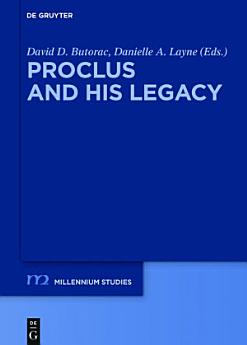Proclus and his Legacy
Danielle Layne · David D. Butorac
2017 පෙබ · Millennium-Studien / Millennium Studies පොත 65 · Walter de Gruyter GmbH & Co KG
ඉ-පොත
466
පිටු
reportඇගයීම් සහ සමාලෝචන සත්යාපනය කර නැත වැඩිදුර දැන ගන්න
මෙම ඉ-පොත ගැන
This volume investigates Proclus' own thought and his wide-ranging influence within late Neoplatonic, Alexandrine and Byzantinian philosophy and theology. It further explores how Procline metaphysics and doctrines of causality influence and transition into Arabic and Islamic thought, up until Richard Hooker in England, Spinoza in Holland and Pico in Italy. John Dillon provides a helpful overview of Proclus' thought, Harold Tarrant discusses Proclus' influence within Alexandrian philosophy and Tzvi Langermann presents ground breaking work on the Jewish reception of Proclus, focusing on the work of Joseph Solomon Delmedigo (1591-1655), while Stephen Gersh presents a comprehensive synopsis of Proclus' reception throughout Christendom. The volume also presents works from notable scholars like Helen Lang, Sarah Wear and Crystal Addey and has a considerable strength in its presentation of Pseudo-Dionysius, Proclus' transmission and development in Arabic philosophy and the problem of the eternity of the world. It will be important for anyone interested in the development and transition of ideas from the late ancient world onwards.
කර්තෘ පිළිබඳ
Danielle A. Layne, Gonzaga University, Spokane WA, USA; David D. Butorac, Fatih University, Istanbul, Turkey.
මෙම ඉ-පොත අගයන්න
ඔබ සිතන දෙය අපට කියන්න.
කියවීමේ තොරතුරු
ස්මාර්ට් දුරකථන සහ ටැබ්ලට්
Android සහ iPad/iPhone සඳහා Google Play පොත් යෙදුම ස්ථාපනය කරන්න. එය ඔබේ ගිණුම සමඟ ස්වයංක්රීයව සමමුහුර්ත කරන අතර ඔබට ඕනෑම තැනක සිට සබැඳිව හෝ නොබැඳිව කියවීමට ඉඩ සලසයි.
ලැප්ටොප් සහ පරිගණක
ඔබට ඔබේ පරිගණකයේ වෙබ් බ්රව්සරය භාවිතයෙන් Google Play මත මිලදී ගත් ශ්රව්යපොත්වලට සවන් දිය හැක.
eReaders සහ වෙනත් උපාංග
Kobo eReaders වැනි e-ink උපාංග පිළිබඳ කියවීමට, ඔබ විසින් ගොනුවක් බාගෙන ඔබේ උපාංගයට එය මාරු කිරීම සිදු කළ යුතු වේ. ආධාරකරු ඉ-කියවනයට ගොනු මාරු කිරීමට විස්තරාත්මක උදවු මධ්යස්ථාන උපදෙස් අනුගමනය කරන්න.








